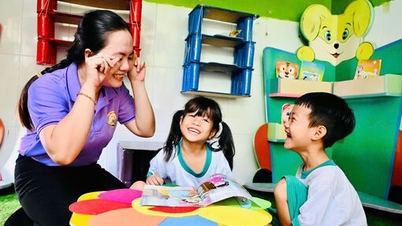 |
| Dr. Nguyen Thi Ngoc Minh believes that it is impossible to measure a child by their scores after each exam. (Photo: NVCC) |
Let your child experience failure
In primary school, my eldest son took the exam to select the school’s excellent student team and failed. He came home, smiling broadly and told his mother: “I failed the team, Mom.” At that time, I didn’t understand what it meant to be an excellent student or to be on the team, so I didn’t feel sad about it.
In the summer of 5th grade, when I returned from America, my child had failed all the middle schools. But he was still happy and carefree, not feeling sad at all. He bragged that his school had a large number of students, he did the test but made mistakes, which dragged his score down.
Grades 7 and 8 were a time of crisis upon crisis. Covid-19 forced my child to stay at home, studying online for up to 8-9 hours a day. I had another baby, my child reached puberty, the whole family was like a boat in a storm. My child was irritable, frustrated, "kicked the bucket and hit the basket" and was addicted to games, neglecting his studies. His academic results plummeted miserably. I didn't know what to do every time the teacher texted to complain about his studies.
Grade 9 is a stressful exam preparation period, it is also the time when my child begins to feel the pressure of studying, feels the bitter taste of failure and begins to make efforts. A glimmer of hope has just been kindled, then another failure comes crashing down. I read the inferiority complex and disappointment, even resentment in my child. But I have no other choice but to let my child experience failure himself...
Grow up after each exam
But when he faced challenges, I began to see in him the qualities of a mature man: honesty, self-respect, responsibility, determination and inner strength to overcome difficulties.
| "It cannot be said that a child with 10 points is worth more than a child with 2 points. Therefore, if we only measure a child's entire maturity by exam scores, it is truly one-sided, shallow and blind." |
I am happy to realize that the person inside my child has gradually emerged, becoming clearer and stronger. I have felt that person inside throughout the journey of raising my child, and have constantly cared for and nurtured that “tree of personality”, but I have also had countless times of doubt, anxiety, disappointment, and even deadlock.
But now, after an exam, I really believe in my child. Not because of the achievements he has made, but because of the courage and inner strength he has discovered when facing failures and challenges.
I don't just see the results of 9 years of study based on the scores my child gets. Of course I'm happy and proud when my child gets high scores. Of course I'm sad when my child gets low scores and fails exams. But you can't just measure the results of 9 years of study by scores.
What about your physical, emotional, and personal growth? What about your values and ideals? How many other achievements cannot be revealed through simple numbers? How many experiences and lessons have you continuously learned in your life - things that cannot be measured by scores.
| "For a child with so many expectations placed on them, failing to get into a 'heavenly difficult' school is considered a failure. Behind what we define as success or failure, there are many social prejudices that, if we are not alert, we will be overwhelmed by them." |
How much joy and good things you have brought to others cannot be measured by numbers. It cannot be said that a child with 10 points is worth more than a child with 2 points.
Therefore, if we only measure a child's overall maturity by exam scores, it is truly one-sided, shallow and blind.
Stay strong before the "storm" of exams
Failure or success in life is just a convention. For a child who has too many expectations placed on him, not being able to pass a "heavenly difficult" school is considered a failure. Behind what we define as success or failure, there are many social prejudices that if we are not alert, we will be drowned by them.
If unfortunately the child does not get the desired results at this time, of course parents can feel sad, disappointed and angry, blame and regret.
But at this point, parents can stop for a moment to ask themselves: What lessons have my child learned during his school years? How has he/she grown? What good qualities have formed in him/her? What potential has not been fully developed in him/her? How can it be developed in the next stages? What additional support does he/she need?
The test results are not important, but it will be a good data for you to analyze and answer these questions. When you ask these questions, you will see things in a different way, more optimistic and calm. And that is when parents can sit down and talk with their children, like adults.
I always believe that education should focus on nurturing and cultivating character rather than measuring children by scores. And if we are aware of this, we will be calm and steady enough to face the "storm" of exams, so that we can take leisurely steps on the journey of parenthood.
Source







![[Photo] Dan Mountain Ginseng, a precious gift from nature to Kinh Bac land](/_next/image?url=https%3A%2F%2Fvphoto.vietnam.vn%2Fthumb%2F1200x675%2Fvietnam%2Fresource%2FIMAGE%2F2025%2F11%2F30%2F1764493588163_ndo_br_anh-longform-jpg.webp&w=3840&q=75)



































































































Comment (0)